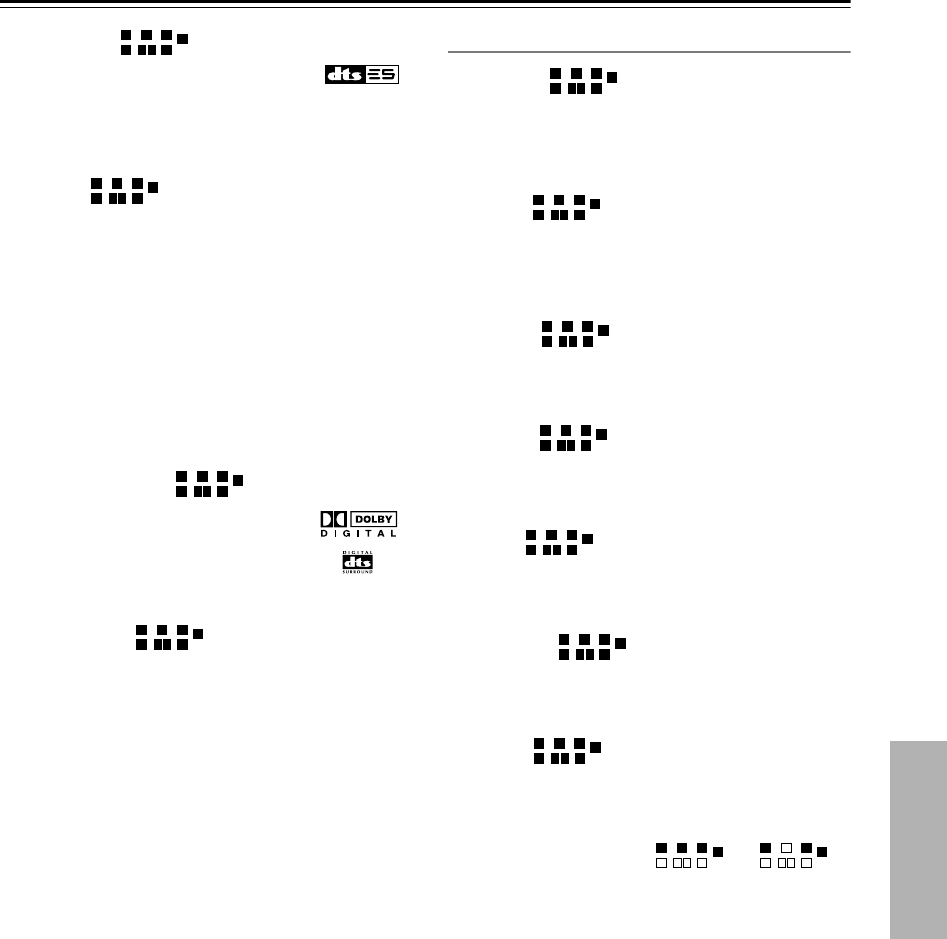
51
Using the Listening Modes
—Continued
DTS-ES Matrix
This mode is for use with DTS-ES Matrix
soundtracks, which use a matrix-encoded
back-channel for 6.1/7.1-channel playback. Use it with
DVDs that bear the DTS-ES logo, especially those with
a DTS-ES Matrix soundtrack.
DTS Neo:6
This mode expands any 2-channel source for 6.1-chan-
nel playback. It uses six full-bandwidth channels of
matrix decoding for matrix-encoded material, providing
a very natural and seamless surround sound experience
that fully envelops the listener.
• Neo:6 Cinema
Use this mode with any stereo movie (e.g., TV, DVD,
VHS).
• Neo:6 Music
Use this mode with any stereo music source (e.g.,
CD, radio, cassette, TV, VHS, DVD).
Dolby Digital + Neo:6
DTS+Neo:6
This mode uses Neo:6 to expand 5.1-chan-
nel Dolby Digital and DTS sources for
6.1/7.1-channel playback. Use it with
DVDs that bear the Dolby Digital or DTS
logo and feature a 5.1-channel soundtrack.
Neural Surround
(TX-SR575 North American model only)
Neural Surround represents the latest advancement in
surround technology developed for music and is adopted
by XM Satellite Radio for digital radio broadcast of sur-
round recordings and live events in surround sound.
Neural Surround employs psychoacoustic frequency-
domain processing, which allows delivery of a more
detailed sound stage, with superior channel separation
and localization of audio elements. System playback is
scalable from 5.1 to 7.1 multichannel surround playback.
Onkyo Original DSP Modes
Mono Movie
This mode is suitable for old movies and other mono
sources. The center speaker outputs the sound as it is,
while reverb is applied to the sound output by the other
speakers, giving presence to even mono material.
Orchestra
Suitable for classical or operatic music, this mode
emphasizes the surround channels in order to widen the
stereo image, and simulates the natural reverberation of
a large hall.
Unplugged
Suitable for acoustic instruments, vocals, and jazz, this
mode emphasizes the front stereo image, giving the
impression of being right in front of the stage.
Studio-Mix
Suitable for rock or pop music, listening to music in this
mode creates a lively sound field with a powerful acous-
tic image, like being at a club or rock concert.
TV Logic
This mode adds realistic acoustics to TV shows pro-
duced in a TV studio, surround effects to the entire
sound, and clarity to voices.
All Ch Stereo
Ideal for background music, this mode fills the entire lis-
tening area with stereo sound from the front, surround,
and surround back speakers.
Full Mono
In this mode, all speakers output the same sound in
mono, so the sound you hear is the same regardless of
where you are within the listening room.
T-D (Theater-Dimensional) or
With this mode, you can enjoy virtual 5.1 surround
sound even with only two or three speakers. This works
by controlling how sounds reach the listener’s left and
right ears. Good results may not be possible if there’s too
much reverb, so we recommend that you use this mode
in an environment with little or no natural reverb.


















